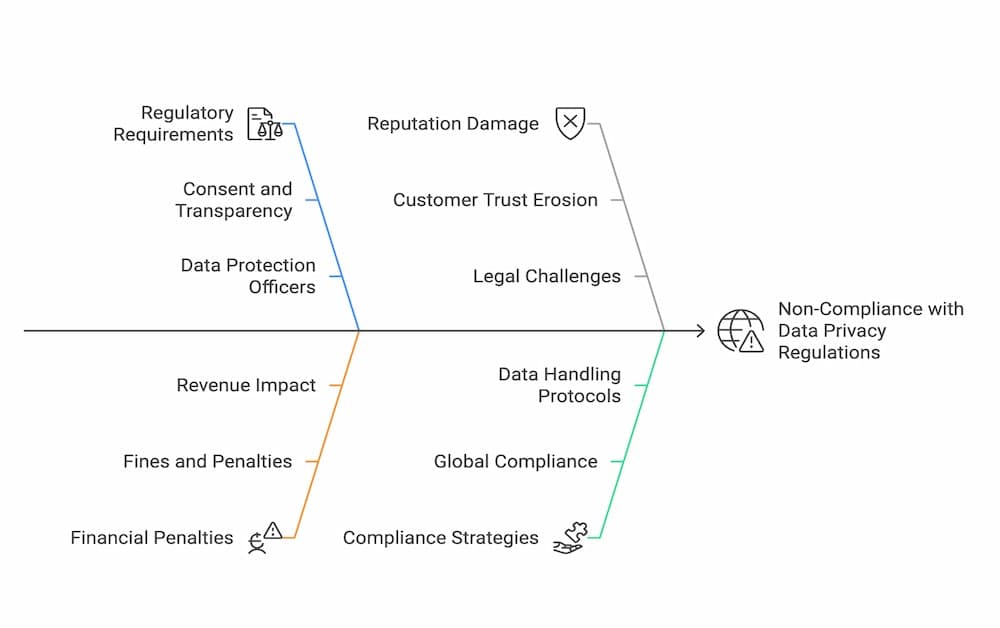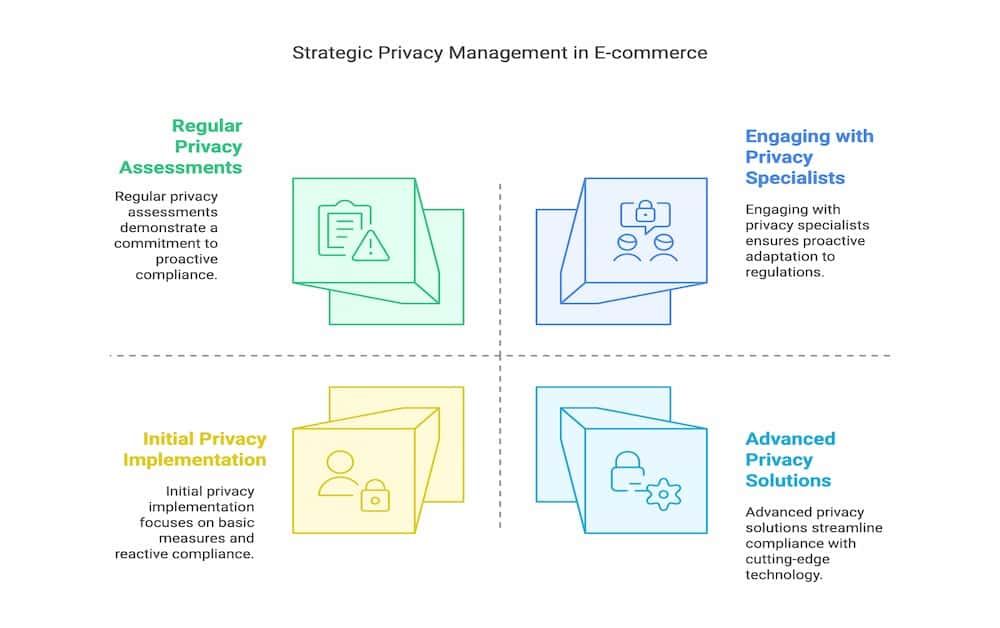Introduction
In today’s digital age, e-commerce has become an integral part of the global economy. As online transactions continue to rise, the importance of protecting customers’ data and maintaining privacy compliance has never been more critical.
Building trust with customers is a fundamental aspect of success in the e-commerce industry. Consumers are becoming more conscious of their privacy rights and anticipate that businesses will manage their personal information with great care and transparency.
Prioritizing data privacy not only helps e-commerce businesses meet legal obligations but also provides a competitive edge in a crowded market. By demonstrating a strong commitment to protecting customer data, companies can differentiate themselves and foster long-term customer loyalty.
What is Data Privacy Compliance?
Data privacy compliance refers to the adherence of organizations to data privacy laws and regulations that govern the collection, processing, and storage of personal data. It involves ensuring that personal data is handled in a way that respects individual’s privacy rights and protects their sensitive information. For e-commerce businesses, data privacy compliance is not just a legal obligation but a cornerstone of building trust with customers. By demonstrating a commitment to protecting personal data, businesses can maintain a competitive edge and avoid the legal and financial risks associated with non-compliance. Adhering to data privacy laws ensures that customer data is managed responsibly, fostering a secure and trustworthy online shopping environment.
Understanding the Role of Privacy in E-Commerce
Protecting customer data is crucial for building trust and loyalty in the digital marketplace. Implementing data protection measures is essential to ensure compliance with data privacy regulations and safeguard personal data. When consumers feel confident that their personal information is secure, they are more likely to engage with an e-commerce platform, make purchases, and recommend the business to others. On the other hand, a data breach or mishandling of customer information can lead to a significant loss of trust and long-term damage to a company’s reputation.
Compliance with privacy regulations safeguards businesses from legal and financial repercussions. With the implementation of strict data protection laws like the General Data Protection Regulation (GDPR) in the European Union and the California Consumer Privacy Act (CCPA) in the United States, e-commerce businesses face substantial fines and penalties for non-compliance. By adhering to these regulations, companies can avoid costly legal battles and maintain their financial stability.
Prioritizing privacy enhances a company’s reputation and competitive advantage. In a market where consumers have countless options, a strong privacy stance can set a business apart. By showcasing a dedication to data protection through clear privacy policies, secure data handling practices, and transparent communication, e-commerce businesses can build a positive brand image and attract privacy-conscious customers. Solutions like those offered at Pandectes can help companies streamline their privacy compliance efforts and gain a competitive edge.

Key Privacy Regulations Impacting E-Commerce
Navigating key data privacy regulations is essential for e-commerce businesses that manage customer data across borders. Several pivotal regulations have set the standard for data protection globally. Among these, the General Data Protection Regulation (GDPR), the California Consumer Privacy Act (CCPA), and Brazil’s General Data Protection Law (LGPD) are particularly influential for their comprehensive scope and enforcement.
General Data Protection Regulation (GDPR)
The GDPR, established by the European Union, enforces rigorous data privacy standards. It requires businesses to obtain explicit consent for data processing and to ensure transparency with consumers regarding data usage. E-commerce platforms catering to EU customers must comply, even if based outside the EU, adhering to protocols like granting individuals the right to access and erase their personal data.
California Consumer Privacy Act (CCPA)
The CCPA is a landmark regulation in the United States that enhances data privacy rights for Californian residents. It mandates that businesses disclose the types of personal data collected and allow consumers to opt-out of data sales. Companies meeting specific thresholds must provide clear privacy notices, reflecting a growing trend toward stricter data privacy measures across the U.S.
Brazil’s General Data Protection Law (LGPD)
Brazil’s LGPD aligns with global data protection trends, emphasizing consent and accountability. Applicable to any entity processing data on Brazilian residents, the LGPD mandates the appointment of data protection officers and necessitates immediate breach notifications. This regulation underscores the increasing importance of global compliance strategies for e-commerce businesses.
Consequences of Non-Compliance
Failing to adhere to these regulations poses significant risks. Companies face substantial fines—GDPR penalties can reach up to €20 million or 4% of annual global revenue. Beyond financial costs, non-compliance can severely harm a business’s reputation, leading to diminished customer trust and potential legal challenges. Maintaining compliance is crucial for protecting both consumer data and business continuity.
Strategies for Ensuring Privacy Compliance
Crafting an effective privacy policy is essential for any e-commerce business aiming to comply with data protection laws. The Personal Information Protection and Electronic Documents Act (PIPEDA) is a crucial component of Canada’s privacy landscape, regulating data privacy for organizations operating in Canada. This policy should meticulously detail how customer data is collected, utilized, and shared, fostering transparency and trust. It’s crucial that the policy remains accessible and intelligible, enabling customers to make informed choices regarding their personal information.
Securing explicit consent from customers is a foundational element of privacy compliance. Businesses must clearly communicate the specifics of data collection and processing, offering uncomplicated ways for customers to opt-out. By maintaining detailed records of consent, organizations can safeguard themselves against legal challenges and align with regulations like GDPR and CCPA.
Enhancing data security through robust measures is imperative to protect customer information from breaches. This includes deploying encryption and firewalls and conducting regular security assessments to pinpoint and address vulnerabilities. Comprehensive training for employees on data protection practices further ensures that privacy remains a central focus throughout the organization.
Data Minimization and Purpose Limitation
Adhering to data minimization and purpose limitation principles is vital in responsible data practices. Organizations should gather only the data essential for specific operational needs, thus minimizing exposure to potential risks. Establishing procedures for ongoing data review and deletion aids in maintaining compliance and mitigating the chances of unauthorized access.
Limiting access to sensitive data strictly on a need-to-know basis enhances data security. By ensuring that only authorized personnel can access such information, businesses can significantly lower the risk of data misuse. Regular audits and reviews of access rights are crucial to keeping data handling practices in line with privacy compliance standards.
Enhancing Customer Trust Through Transparency
Establishing clear and open communication about data usage is essential for gaining consumer confidence in e-commerce. By simplifying privacy policies and avoiding technical jargon, businesses can ensure that customers fully grasp how their data is handled. This approach not only enhances understanding but also reinforces a brand’s integrity and dedication to consumer rights.
Empowering customers with easy access to their personal data is vital for fostering trust. Providing straightforward mechanisms for users to view, modify, or delete their information aligns with best practices in data privacy. This accessibility demonstrates a commitment to transparency and respects the consumer’s control over personal information. Keeping customers informed of any modifications to privacy policies further solidifies this trust, maintaining an ongoing dialogue about data management practices.
Responding to Data Subject Requests
Effectively managing data subject requests is crucial for maintaining transparency. Establishing streamlined processes for data access and modification requests ensures that consumers feel valued and respected. Prompt and precise responses to these requests highlight the organization’s commitment to safeguarding consumer data and adhering to privacy laws.
Training employees to adeptly handle data inquiries underscores the importance of privacy within the company. Well-informed staff can provide a seamless experience, strengthening customer confidence in the business’s ability to manage personal data responsibly. This focus on employee preparedness ensures that interactions are handled professionally, reinforcing the business’s reputation for reliability and trustworthiness.

Leveraging Privacy as a Competitive Advantage
E-commerce businesses can significantly enhance their market position by embedding robust privacy measures into their core strategies. By emphasizing the protection of customer data, companies can stand out in a crowded market and attract customers who prioritize privacy. This dedication to privacy acts as a magnet for those seeking secure and transparent online shopping experiences, thereby fostering a loyal customer base.
Incorporating privacy-focused values into marketing and branding efforts can further differentiate a business. By clearly communicating data protection commitments, companies can convey a trustworthy image that resonates with consumers. This transparency not only improves brand perception but also encourages more meaningful customer engagement.
Maintaining up-to-date privacy practices is crucial for compliance with the latest data protection regulations. Regular assessments and enhancements to privacy protocols demonstrate a proactive approach to safeguarding consumer information. This readiness helps businesses stay aligned with legal requirements and reinforces their reputation for reliability in data management.
Partnering with Trusted Privacy Solutions
Engaging with leading privacy management solutions and services allows businesses to streamline compliance efforts efficiently. These tools provide comprehensive capabilities for overseeing consent and managing data processing activities, enabling businesses to focus on their primary objectives. By utilizing established solutions, companies can leverage cutting-edge advancements in privacy technology.
Consulting with privacy specialists and legal advisors is essential for understanding and navigating complex data protection frameworks. Their insights ensure that privacy policies are not only compliant but also forward-thinking, adapting to future regulatory shifts. This expertise helps companies maintain a robust privacy infrastructure that is both effective and adaptable.
Conclusion
Conducting frequent reviews and audits of privacy practices helps identify areas for improvement and optimize data handling processes. These evaluations provide valuable feedback on the current state of data protection measures, guiding necessary adjustments. Through continuous monitoring and refinement, e-commerce businesses can sustain a competitive edge with a strong commitment to data privacy.
E-commerce businesses can foster long-lasting customer relationships built on trust and transparency by prioritizing privacy compliance. Investing in robust data protection measures safeguards your company from legal and financial risks and sets you apart in a competitive market. If you’re looking to streamline your privacy compliance efforts and build customer trust, try Pandectes to make your Shopify store compliant with GDPR and other privacy regulations – we’re here to help you navigate the complex world of data privacy and ensure your e-commerce success.






